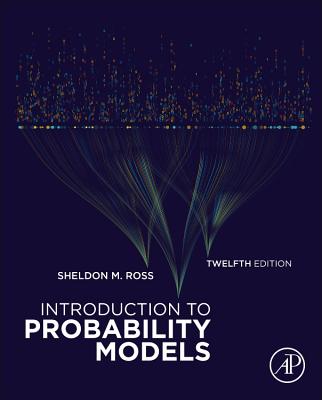Statistical Inference, 2/e
暫譯: 統計推論(第二版)
George Casella, Roger L. Berger
- 出版商: Duxbury
- 出版日期: 2001-06-18
- 售價: $1,480
- 貴賓價: 9.8 折 $1,450
- 語言: 英文
- 頁數: 660
- ISBN: 0534243126
- ISBN-13: 9780534243128
-
相關分類:
機率統計學 Probability-and-statistics
-
相關翻譯:
統計推論 (Statistical Inference, 2/e) (繁中版)
立即出貨
買這商品的人也買了...
-
 Signals & Systems, 2/e (訊號與系統) (原文導讀版)
Signals & Systems, 2/e (訊號與系統) (原文導讀版)$1,100$1,078 -
 Structure and Interpretation of Computer Programs, 2/e (Paperback)
Structure and Interpretation of Computer Programs, 2/e (Paperback)$2,800$2,660 -
 $1,715RF Microelectronics, 2/e (IE-Paperback)
$1,715RF Microelectronics, 2/e (IE-Paperback) -
 Linear Algebra, 4/e (IE-Paperback)
Linear Algebra, 4/e (IE-Paperback)$1,450$1,421 -
 Probability and Statistical Inference, 9/e (IE-Paperback)
Probability and Statistical Inference, 9/e (IE-Paperback)$1,380$1,242 -
 Bayesian Data Analysis, 3/e (Hardcover)
Bayesian Data Analysis, 3/e (Hardcover)$1,850$1,813 -
 Deep Learning (Hardcover)
Deep Learning (Hardcover)$1,650$1,617 -
 Elementary Statistics: A Step by Step Approach, 10/e (IE-Paperback)
Elementary Statistics: A Step by Step Approach, 10/e (IE-Paperback)$1,350$1,323 -
 Introduction to Probability Models, 12/e (美國原版)
Introduction to Probability Models, 12/e (美國原版)$3,890$3,696 -
 Mathematical Statistics and Data Analysis, 3/e (IE-Paperback)(with CD Data Sets)(書況略舊,不介意在下單)
Mathematical Statistics and Data Analysis, 3/e (IE-Paperback)(with CD Data Sets)(書況略舊,不介意在下單)$1,360$1,333 -
 A First Course in Probability, 10/e (GE-Paperback)
A First Course in Probability, 10/e (GE-Paperback)$1,340$1,273 -
 機器學習工程師面試全破解:嚴選 124道 AI 演算法決勝題完整剖析
機器學習工程師面試全破解:嚴選 124道 AI 演算法決勝題完整剖析$650$507 -
 Statistical Rethinking: A Bayesian Course with Examples in R and Stan, 2/e (Hardcover)
Statistical Rethinking: A Bayesian Course with Examples in R and Stan, 2/e (Hardcover)$4,230$4,019 -
 Introduction to Mathematical Statistics, 8/e (GE-Paperback)
Introduction to Mathematical Statistics, 8/e (GE-Paperback)$1,460$1,387 -
 $403機器學習中的概率統計:Python 語言描述
$403機器學習中的概率統計:Python 語言描述 -
 Introduction to Linear Regression Analysis, 6/e (Hardcover)
Introduction to Linear Regression Analysis, 6/e (Hardcover)$1,680$1,646 -
 統計學歷屆試題詳解 (110~108年)(適用: 統計所.應數所)
統計學歷屆試題詳解 (110~108年)(適用: 統計所.應數所)$420$378 -
 SMRD : Statistical Methods for Reliability Data, 2/e (Hardcover)
SMRD : Statistical Methods for Reliability Data, 2/e (Hardcover)$1,820$1,784 -
 Probabilistic Machine Learning: An Introduction (Hardcover)
Probabilistic Machine Learning: An Introduction (Hardcover)$2,650$2,597 -
 Industrial Organization: Markets and Strategies, 2/e (Paperback)
Industrial Organization: Markets and Strategies, 2/e (Paperback)$1,580$1,548 -
 Elementary Differential Equations and Boundary Value Problems, 12/e (IE-Paperback)
Elementary Differential Equations and Boundary Value Problems, 12/e (IE-Paperback)$1,640$1,607 -
 Introduction to Linear Algebra, 6/e (paper)
Introduction to Linear Algebra, 6/e (paper)$1,300$1,274 -
 Introduction to Probability Models, 13/e (Paperback)
Introduction to Probability Models, 13/e (Paperback)$3,980$3,781 -
 A First Course in Differential Equations with Modeling Applications, 12/e (AE-Paperback)
A First Course in Differential Equations with Modeling Applications, 12/e (AE-Paperback)$1,560$1,529 -
 Applied Multivariate Statistical Analysis 6/e
Applied Multivariate Statistical Analysis 6/e$4,880$4,636
相關主題
商品描述
Description
This book builds theoretical statistics from the first principles of probability theory. Starting from the basics of probability, the authors develop the theory of statistical inference using techniques, definitions, and concepts that are statistical and are natural extensions and consequences of previous concepts. Intended for first-year graduate students, this book can be used for students majoring in statistics who have a solid mathematics background. It can also be used in a way that stresses the more practical uses of statistical theory, being more concerned with understanding basic statistical concepts and deriving reasonable statistical procedures for a variety of situations, and less concerned with formal optimality investigations.
Table of Contents
1. PROBABILITY THEORY. Set Theory. Probability Theory. Conditional Probability and Independence. Random Variables. Distribution Functions. Density and Mass Functions. Exercises. Miscellanea.
2. TRANSFORMATION AND EXPECTATIONS. Distribution of Functions of a Random Variable. Expected Values. Moments and Moment Generating Functions. Differentiating Under an Integral Sign. Exercises. Miscellanea.
3. COMMON FAMILIES OF DISTRIBUTIONS. Introductions. Discrete Distributions. Continuous Distributions. Exponential Families. Locations and Scale Families. Inequalities and Identities. Exercises. Miscellanea.
4. MULTIPLE RANDOM VARIABLES. Joint and Marginal Distributions. Conditional Distributions and Independence. Bivariate Transformations. Hierarchical Models and Mixture Distributions. Covariance and Correlation. Multivariate Distributions. Inequalities. Exercises. Miscellanea.
5. PROPERTIES OF A RANDOM SAMPLE. Basic Concepts of Random Samples. Sums of Random Variables from a Random Sample. Sampling for the Normal Distribution. Order Statistics. Convergence Concepts. Generating a Random Sample. Exercises. Miscellanea.
6. PRINCIPLES OF DATA REDUCTION. Introduction. The Sufficiency Principle. The Likelihood Principle. The Equivariance Principle. Exercises. Miscellanea.
7. POINT EXTIMATION. Introduction. Methods of Finding Estimators. Methods of Evaluating Estimators. Exercises. Miscellanea.
8. HYPOTHESIS TESTING. Introduction. Methods of Finding Tests. Methods of Evaluating Test. Exercises. Miscellanea.
9. INTERVAL ESTIMATION. Introduction. Methods of Finding Interval Estimators. Methods of Evaluating Interval Estimators. Exercises. Miscellanea.
10. ASYMPTOTIC EVALUATIONS. Point Estimation. Robustness. Hypothesis Testing. Interval Estimation. Exercises. Miscellanea.
11. ANALYSIS OF VARIANCE AND REGRESSION. Introduction. One-way Analysis of Variance. Simple Linear Regression. Exercises. Miscellanea.
12. REGRESSION MODELS. Introduction. Regression with Errors in Variables. Logistic Regression. Robust Regression. Exercises. Miscellanea. Appendix. Computer Algebra. References.
商品描述(中文翻譯)
**描述**
本書從概率論的基本原理建立理論統計。從概率的基礎開始,作者使用統計技術、定義和概念來發展統計推斷理論,這些技術、定義和概念是先前概念的自然延伸和結果。本書旨在為一年級研究生而寫,適合具有堅實數學背景的統計專業學生使用。它也可以以更強調統計理論實際應用的方式使用,更關注於理解基本統計概念並為各種情況推導合理的統計程序,而不太關心正式的最優性研究。
**目錄**
1. 概率論。集合論。概率論。條件概率與獨立性。隨機變數。分佈函數。密度函數與質量函數。練習題。雜項。
2. 變換與期望。隨機變數函數的分佈。期望值。矩與矩生成函數。在積分符號下微分。練習題。雜項。
3. 常見的分佈族。介紹。離散分佈。連續分佈。指數族。位置與尺度族。不等式與恆等式。練習題。雜項。
4. 多重隨機變數。聯合與邊際分佈。條件分佈與獨立性。雙變量變換。層級模型與混合分佈。協方差與相關性。多變量分佈。不等式。練習題。雜項。
5. 隨機樣本的性質。隨機樣本的基本概念。來自隨機樣本的隨機變數之和。正態分佈的抽樣。順序統計量。收斂概念。生成隨機樣本。練習題。雜項。
6. 數據簡化原則。介紹。充分性原則。似然原則。等變原則。練習題。雜項。
7. 點估計。介紹。尋找估計量的方法。評估估計量的方法。練習題。雜項。
8. 假設檢定。介紹。尋找檢定的方法。評估檢定的方法。練習題。雜項。
9. 區間估計。介紹。尋找區間估計量的方法。評估區間估計量的方法。練習題。雜項。
10. 漸近評估。點估計。穩健性。假設檢定。區間估計。練習題。雜項。
11. 方差分析與回歸。介紹。單向方差分析。簡單線性回歸。練習題。雜項。
12. 回歸模型。介紹。變數中的誤差回歸。邏輯回歸。穩健回歸。練習題。雜項。附錄。計算機代數。參考文獻。












